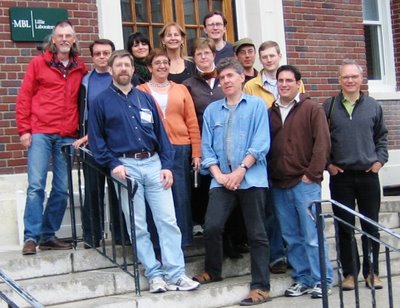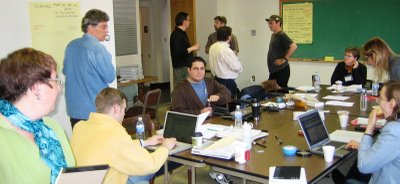- To provide a workshop model that can be repeated, evolve in response to evaluations, and adapted by participants.
Funding for the 2008 workshop has been provided by a no-cost extension to National Science Foundation grant SES-0551843
Spring 2008 Workshop
"Science-in-society: Teaching and engaging across boundaries"
Applications were sought from teachers and researchers (including graduate students) who are interested in promoting the social contextualization of science through interdisciplinary education and outreach activities beyond their current disciplinary and academic boundaries. Preference was given to participants in previous NewSSC workshops funded by the NSF, with a view to learning from and advancing our efforts to produce new curriculum or outreach activities based on those workshops and to use them in our "teaching and engaging across boundaries."Location: Marine Biological Laboratory (MBL), Woods Hole MA, USA
Dates April 24 (Thurs, 9am)-27 (Sun, 4), 2008
Organizer & Lead Facilitator: Peter J. Taylor, University of Massachusetts Boston, Programs in Science, Technology and Values and Critical and Creative Thinking.
(arrangements)
Sections to follow (or to be added in due course) and associated links
(This time around much of the working, "in progress" material has been developed on a wiki, and only the final products and reports are posted here. Thus some of these links are placeholders for material not yet available.)-
Adjustments relative to previous workshops
Profiles of participants and their publications
Program with links to associated materials
Photos and other images
New curriculum or outreach activities that participants submit to the expanding compilation of Online Resources for Science-in-Society Education and Outreach
Evaluation Summaries by participants (pdf of full evaluations)
Summary of evaluations in relation to NewSSC objectives
Adjustments relative to previous workshops
List of participants, short profiles, and webpages
Douglas AllchinUniversity of Minnesota
History and philosophy (HP) of biology research on cases of error and disagreement in science. Teaching history of science to science teachers and guiding them in preparing HP of Science-oriented materials.
Paul Erikson
U. Michigan -> Wesleyan U.
Studies the relationship between scientific knowledge and policy responses: how the statistics, graphs, and models we choose to represent reality shape and constrain the way we intervene in the world; policy debates on issues of health and the environment.
Kurt Jax
UFZ Environmental Research Centre Leipzig
History and philosophy of ecology
Wendy Hamblet
Philosophy, North Carolina Agricultural and Technical State University
My interest is in thinking about Science in Society issues from a fundamental challenge facing all (and especially higher education) teachers. I wonder: "What is the best form of paideia for fostering socially responsible citizenship appropriate to a democratic society?"
Amy Lesen
Dillard University
Environmental history as it pertains to coastal areas and communities. Ecology and resource management and the study of coastal cultures and economies. Collaboration with architects, urban planners, and industrial designers in environmental sustainability and sustainable urban planning. Modern ecology and paleoecology used to study changes in ecosystems and to tease apart natural changes from anthropogenic ones.
Marisa Santos Matias
U. Coimbra, Portugal
Relations between health, environment and sustainability, namely through their enactment in situations of public controversy
Mary McGuire
Virgina Commonwealth U. -> Virgina Tech.
Analysis of biological and social reproduction on the tobacco farms, as it applies to ecology, modes of production, and worldviews, suggested that contests for power are not only those between indigenous and invading cultures but also those between men and women who vie for power within the same environment. This is part of a long term intellectual inquiry into the unique aspects of the societies and cultures of the tobacco growing regions around the world.
Pat Munday
Montana Tech
Professor of History & Philosophy. Using the tools of the social history of science and actor-network theory, Pat hopes to discover, describe, and assess the role of activist scientists, grass roots organizations, and local culture in the social construction of Superfund remedies. He is also interested and involved in other environmental work in the northern Rockies--including native species restoration, forestry management, and land use practices.
João Arriscado Nunes
Coimbra, Portugal
Training courses for environmental protection staff, activists and members of the Civil Protection Agency, as well as in initiatives in science education and the development of participatory procedures in the fields of assessment of controversial knowledge and technology, health and environment
JoAnn Oravec
University of Wisconsin, Whitewater
Jeremy Price
Boston College
Doctoral student in science and technology education (Department of Curriculum and Instruction/Teacher Education) and graduate Research Assistant with the Urban Ecology Institute. Interested in how emerging technologies can facilitate collaborative inquiry and activism around socioscientific issues. Assisting in the development of a national urban ecology curriculum for high school students.
Erich Schienke
Penn State
Researches how environmental knowledge is produced, prioritized, and communicated between scientists, policy makers, and the public. Geopolitically, interest in these questions remains situated in contemporary China. Currently a Postdoctoral Fellow at the Pennsylvania State University's Rock Ethics Institute and a Lecturer in the Science, Technology and Society Program. At the Rock Ethics Institute, works on two projects: the Ethical Dimensions of Climate Change (EDCC) initiative, and a research project, supported by a grant from the NSF, concerning the training of ethics to environmental science graduate students.
Peter Taylor (organizer)
UMass Boston
STS, and critical pedagogy/reflective practice have come together for me in a project of stimulating researchers to self-consciously examine the complexity of their social situatedness so as to change the ways they address the complexity of ecological and socio-environmental situations. Seeks to promote a vision of critical science and environmental education that extends from improved teaching of scientific concepts and methods to supporting people to become resilient and reorganize their lives, communities, and economies in response to social and environmental changes. Now taking these interests in new directions through engagement with various social epidemiological approaches that address the intersections of environment, health, and development. Studies the "unruly complexity" or "intersecting processes" of, respectively, ecological or environmental situations and the social situations in which the environmental research is undertaken. These cannot be understood from an outside view; instead positions of engagement must be taken within the complexity. Knowledge production needs to be linked with planning for action and action itself in an ongoing process so that knowledge, plans, and action can be continually reassessed in response to developments -- predicted and surprising alike.
Lee Worden
Independent Scholar, San Franscisco
Self-organization, collective dynamics, and transformation. Ecological evolution, community structure, and dynamics. Cultural change, consensus formation, democracy, cooperation. Critical analysis of scientific discourses. Ways of facilitating global justice, equality, solidarity and sustainability.
wiki version of program
Participants (minus JoAnn O)

Scene from the workshop

Last update 15 July '08